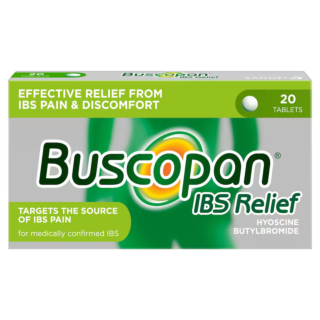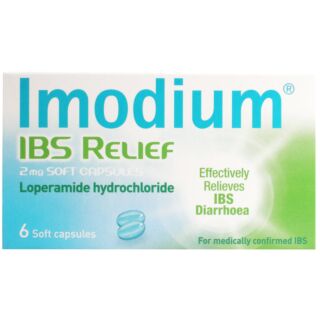Irritable Bowel Syndrome (IBS) – Causes, Symptoms and Treatment

Irritable Bowel Syndrome (IBS) is a common condition that affects the digestive system. It causes symptoms like diarrhoea, constipation, stomach cramps and bloating. Unfortunately, there isn’t a cure for IBS, but by making diet changes and taking medication, most people are able to get their symptoms under control.
The cause of IBS is still unknown. However, it’s thought to be connected to stress, a family history of IBS, oversensitive nerves in the gut, and food passing through the gut too quickly or too slowly.
Symptoms
Irritable bowel syndrome symptoms include: diarrhoea, constipation, bloating and abdominal pain or cramps that are typically worse after eating and better after having a bowel movement. With IBS, symptoms can get better or worse on a day-to-day basis, or they may be triggered by certain food or drink.
Other symptoms you might experience with IBS include:
- Flatulence
- Change in bowel habits
- Passing mucus from your bottom
- Tiredness and a lack of energy
- Nausea
- Backache
- Urination problems, like having a sudden urge to pee, needing it more often, or feeling like you’re unable to fully empty your bladder
- Bowel incontinence
Not only can chronic constipation and diarrhoea cause haemorrhoids, but those with an IBS diagnosis are more likely to have a poor quality of life and experience mood disorders like depression and anxiety.
Types of IBS
There are 5 different types of IBS. The more aware you are of your symptoms, the easier it is to receive an accurate diagnosis. In turn, this helps you to get effective and tailored treatment to make living with IBS manageable.
IBS-C
IBS-C stands for IBS with constipation. With this type of IBS, you’re likely to have fewer bowel movements, strain when you do have them, and your stool will appear hard or lumpy. You may also experience stomach pain, flatulence and bloating.
IBS-D
IBS-D is simply IBS with diarrhoea, the opposite of IBS-C. If you have this type, your stools will frequently be loose and watery, along with symptoms of abdominal pain, an urgent need to pass a bowel movement and excessive flatulence.
IBS-M
Some people experience a mixture of both constipation and diarrhoea. This is known as IBS-M, which stands for ‘mixed’. If you have IBS-M, it means your stools will be both hard and loose, but both must occur evenly.
Post-infectious IBS
If you’ve had a gastrointestinal infection (GI), you can develop symptoms afterwards; this is known as post-infectious IBS. Chronic inflammation in addition to gut flora and intensional permeability issues can linger even after the infection has cleared. Diarrhoea is a prominent sign of post-infectious IBS, along with vomiting.
Post-diverticulitis IBS
Diverticulitis happens when the pouches in the lower part of your large intestine (known as diverticula) become infected or inflamed. If you’ve had diverticulitis, you could be at risk of developing IBS.
Diverticulitis itself causes nausea, stomach pain, fever and constipation. Post-diverticulitis IBS is a potential complication after the infection has been treated.
Causes
What causes irritable bowel syndrome? The exact cause is still unknown. Many reasons have been suggested, but none have been proven to cause it. Despite this, an IBS diagnosis is common after gastroenteritis or a bout of food poisoning. Stress, family history, eating irregularly or having an abnormal diet could be responsible, too.
If you’re taking long-term medication for a chronic condition, it can result in IBS symptoms like diarrhoea. There’s also a link between the nervous system and the brain, with the hormone and nerve signals bouncing between the bowel and the brain possibly affecting regular bowel function.
Additionally, these nerves are more active when you’re stressed, causing the intestines to be extra sensitive.
IBS triggers
What triggers your IBS depends on what type of IBS you have, and it can differ from person to person. Sometimes, the symptoms of IBS can be unexpected, like when you’ve eaten something new, for example.
Conversely, for other people, stress, anxiety, certain medication and your menstrual cycle can trigger a bout of symptoms, too. Below we’ll go into further detail about the specific triggers and what you can do to help prevent an outbreak.
IBS-C triggers
Products that can make IBS-C worse include:
- Refined breads and cereals, like white bread
- Processed foods
- Coffee
- Fizzy drinks
- Alcohol
- High-protein diets
- Dairy, especially cheese
You can improve your constipation symptoms by making small changes to your diet. Start by slowly increasing your fibre intake by 2-3 grams per day until you’re consuming 25 grams for women or 38 grams for men.
Good sources of fibre include wholegrain bread and cereals, fruits and vegetables, and legumes, such as lentils or beans. You should aim to keep hydrated by drinking plenty of water each day.
IBS-D triggers
People with IBS-D should avoid:
- Lots of fibre, especially insoluble fibre, like the skin on fruits and vegetables
- Caffeine
- Fizzy drinks
- Alcohol
- Fried and fatty foods
- Large meals
- Dairy products
To help prevent side effects, you should eat smaller portions and try to eat a moderate amount of soluble fibre to bulk your stools. Integrate things like wholemeal bread, pasta and rice; oats, barley, dried fruits, and fruit without the skin.
Avoid consuming foods of opposing temperatures, like freezing-cold water and piping hot soup in the same meal. Beans and vegetables like onions, celery, cabbage and broccoli should be avoided, too, as they can cause excessive flatulence and bloating which can make you feel worse.
Stress and anxiety IBS triggers
Whether you’re struggling with an anxiety disorder or your everyday life is filled with different kinds of stress, these feelings could be aggravating your IBS symptoms. Stress and anxiety is a personal feeling, but the most common causes include:
- Work-related problems
- Relationship problems
- Divorce
- Bereavement
- Money struggles
- When things are out of your control
Menstrual IBS triggers
During your period, IBS symptoms are typically worse. Of course, there isn’t much you can do to prevent the symptoms from occurring, but you do have options. Some women choose to take birth control, like the contraceptive pill.
Not only does the contraceptive pill protect you against any unwanted pregnancies, but certain contraceptive pills can also regulate your periods and make them lighter; this could potentially reduce the severity of your symptoms.
However, you should always speak to your doctor or Chemist4U pharmacist to see if the contraceptive pill is right for you and your IBS.
Medication IBS triggers
Certain medicines can trigger a bout of IBS constipation or diarrhoea. If you have IBS, antibiotics, some antidepressants and medicines containing sorbitol, an ingredient found in cough syrup, are more likely to negatively affect you.
If you’re taking any of these, it’s a good idea to speak to your doctor to see if there are any alternatives. You should never suddenly stop taking any prescribed medicines without speaking to a healthcare professional first.
Diagnosis
If you think you have IBS, you should make an appointment with your GP to receive an accurate IBS diagnosis.
At your appointment, your GP will ask about your symptoms, if they come and go, how often you get them and when you get them, and the length of time they’ve been present. Additionally, they may feel your stomach to check for any lumps or swelling.
There isn’t a test to diagnose IBS, but your GP might send you for additional tests to rule out any other possible causes. They may request blood tests for issues like coeliac disease, or test a sample of stool for any infections or inflammatory bowel disease (IBD).
If your GP suspects an IBS diagnosis, they’ll be able to provide you with more information about the condition and what your treatment options are.
Treatment
While there isn’t a cure yet, there are several irritable bowel syndrome treatments available to help manage your symptoms. It’s important to note that there is no one-size-fits-all treatment for IBS.
What works for one person may not work for another, and it may take some trial and error to find the right treatment plan for you. If you’re struggling with IBS symptoms, it’s important to talk to your doctor about your treatment options and work together to find the best approach for your needs.
Alternative treatments
The first line of treatment for IBS is usually lifestyle changes. This includes things like increasing fibre in your diet, drinking plenty of water, and exercising regularly. These changes can help regulate bowel movements and reduce symptoms like bloating and abdominal pain.
For more severe cases of IBS, your doctor may recommend cognitive behavioural therapy (CBT). This form of therapy can help you manage stress and anxiety, which are known triggers for IBS symptoms. CBT can also help you develop coping mechanisms for dealing with flare-ups and managing your symptoms over the long-term.
Another treatment option is hypnotherapy, which has been shown to be effective in reducing IBS symptoms in some people. During hypnotherapy sessions, a trained practitioner will guide you into a relaxed state and suggest ways to manage your symptoms.
While the exact mechanism by which hypnotherapy works is not fully understood, many people find it helpful in reducing their symptoms.
Medical treatments
One of the most commonly prescribed medications for IBS is antispasmodics. These medications work by relaxing the muscles in the gut, which can help relieve abdominal pain and cramping. Antispasmodics are available in both prescription and over-the-counter forms.
Another medication commonly used to treat IBS is laxatives. Laxatives can help relieve constipation, which is a common symptom of IBS. However, it is important to note that overuse of laxatives can lead to dependency and may worsen symptoms over time.
In some cases, your doctor may also prescribe antidepressants to manage IBS symptoms. While these medications are typically used to treat depression, they can also help relieve abdominal pain and other IBS symptoms.
Probiotics may also be recommended, as they can help regulate the balance of bacteria in the gut. Studies have shown that probiotics can be beneficial for managing IBS symptoms, particularly in reducing bloating, abdominal pain, and constipation.
However, it’s important to note that not all probiotics are created equal, and more research is needed to fully understand the benefits of specific strains.









